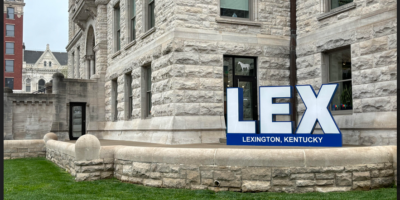An update on the Nehemiah Action Assembly
NoC News
Over 1,500 people arrived at NorthEast Christian Church on the windy Monday evening of April 23 to call for the amelioration of several social justice issues in Lexington. On the docket: predatory payday lending, the Affordable Housing Trust Fund (AHTF), and employment barriers for ex-offenders.
The large gathering was BUILD’s (Building a United Interfaith Lexington through Direct Action) yearly Nehemiah Action, which is the culmination of a year-long process that includes listening sessions on community problems, research on solutions and best practices, and engagement with those who hold the power to create systemic change in Lexington, i.e. public officials.
Payday lending
In its research, BUILD found that payday loans can carry an APR of up to 391 percent, making it usury of Biblical proportions. The group has joined with a coalition of 60 organizations across the state to advocate for legislation capping the APR for payday loans at 36 percent—the rate Congress set for military personnel who were being crippled by predatory payday lending.
Although a bill has been filed in the Kentucky House of Representatives, it has not gained momentum. Embracing its reputation for being tenacious, if not downright obstinate, in the face of political feet-dragging, BUILD committed to redoubling its efforts for policy change in Frankfort next legislative year.
The AHTF
The next issue on the agenda, the AHTF, was proof positive of BUILD’s persistence. The organization began working on justice issues regarding housing as far back as 2007. In 2008 BUILD, with other organizations, proposed an AHTF to rectify some of the housing inequities in Lexington.
At BUILD’s request, in spring 2008 then-Mayor Newberry agreed to put together a taskforce on an AHTF. The commission, quick on its feet, issued a report by September 2008.
As its yardstick, the AHTF Commission defined affordable housing as “housing that requires families and individuals to pay no more than thirty percent (30%) of their income for housing and housing related costs.”
Of the rental households in Fayette County, more than 45% currently pay more than one-third of their gross household income on rent. This means that these households are not affordably housed. Worse yet, 18% of renter households pay more than half of their income for housing, leaving these neighbors in danger of becoming homeless, according to the Central Kentucky Homelessness and Housing Initiative.
At a March 2011 council meeting, Commonwealth Economics, a firm hired by the Council to study the fiscal, economic, and social impact of an AHTF in Lexington, presented their study on the issue.
“Housing trust funds are dedicated sources of revenue to help low- and moderate-income people achieve affordable housing,” Commonwealth Economics writes in its report.
“In most cases, a government agency—usually an existing housing agency—administers the housing trust fund and awards grants and loans to local governments, non-profit developers, for-profit developers, and, in some cases, individuals, for a variety of low- and moderate-income housing activities.”
The study found that a local AHTF would, on average, produce approximately 470 housing opportunities each year, along with 150 new construction jobs and 320 rehabilitation projects.
The research also found that “more than 363 new jobs will be directly and indirectly supported by trust fund investment.” Additionally, “more than $43.3 million of direct, indirect and induced economic activity will be generated from trust fund investment.”
After almost five years, the volleying of the AHTF question between various Council committees, and much “studying,” Council is still generally squeamish about standing for affordable housing in Lexington. The several councilmembers who have committed to this form of justice, and who affirmed that stance at the Nehemiah Action, were Chris Ford (District 1), Tom Blues (District 2), and Steve Kay (At-Large). If your councilmember is not in that list, you’re encouraged to call their office and press for the importance of an AHTF. Tell your councilmember: “Stop shuffling the AHTF.”
Employment and ex-offenders
BUILD began attending to the issue of re-entry of ex-offenders in December 2010. In its research, the organization found that 20,000 people in Lexington have a criminal background and that even persons with misdemeanors have problems finding employment.
BUILD also found that if ex-offenders do not find employment and are not able to regain footing in their lives, they are more likely to commit another offense. In fact, within 90 days of release, they are 500 times more likely meet the law again. High recidivism threatens to create a permanent underclass in our city.
In the organization’s view, the first step toward removing barriers for ex-offenders is “to review city jobs that do not require background checks by law to determine which of those positions should require background checks because they are sensitive and which positions should not require background checks. Then, adjust city policy to eliminate background checks on the jobs they determine do not require them.”
Because the mayor backed away from the issue last year at the Nehemiah Action, this year BUILD proposed baby steps for the mayor’s administration.
First, they asked Mayor Gray if he would attend a workshop organized by BUILD on the issue.
Second, they asked Mayor Gray to engage members of his administration and major local employers to attend the workshop.
Third, they asked Mayor Gray to meet with BUILD again to “develop strategies focused on removing employment barriers for ex-offenders.”
The mayor’s answer: “Y-E-S.”
The assembly warmly accepted the mayor’s acquiescence, but it’s hard to see if it was a real victory. Certainly, it was better PR for the mayor after last year’s awkwardness. BUILD knows its own mind, and its mind is inclined toward action, so while “educating” the mayor on the issue may be an action, it’s a relatively small one that plays to the mayor’s inclination toward “studying.” With the mayor, City Council seems perennially ready to study this or that issue (and spend lots of money doing it), but much slower to take a concrete stand on issues that effect the lives of Lexingtonians hit hard by poverty and systemic disenfranchisement.
Nonetheless, the Nehemiah Action affirmed that solidarity with the poor and downtrodden can be a place of power and a position from which to do justice.




Leave a Reply